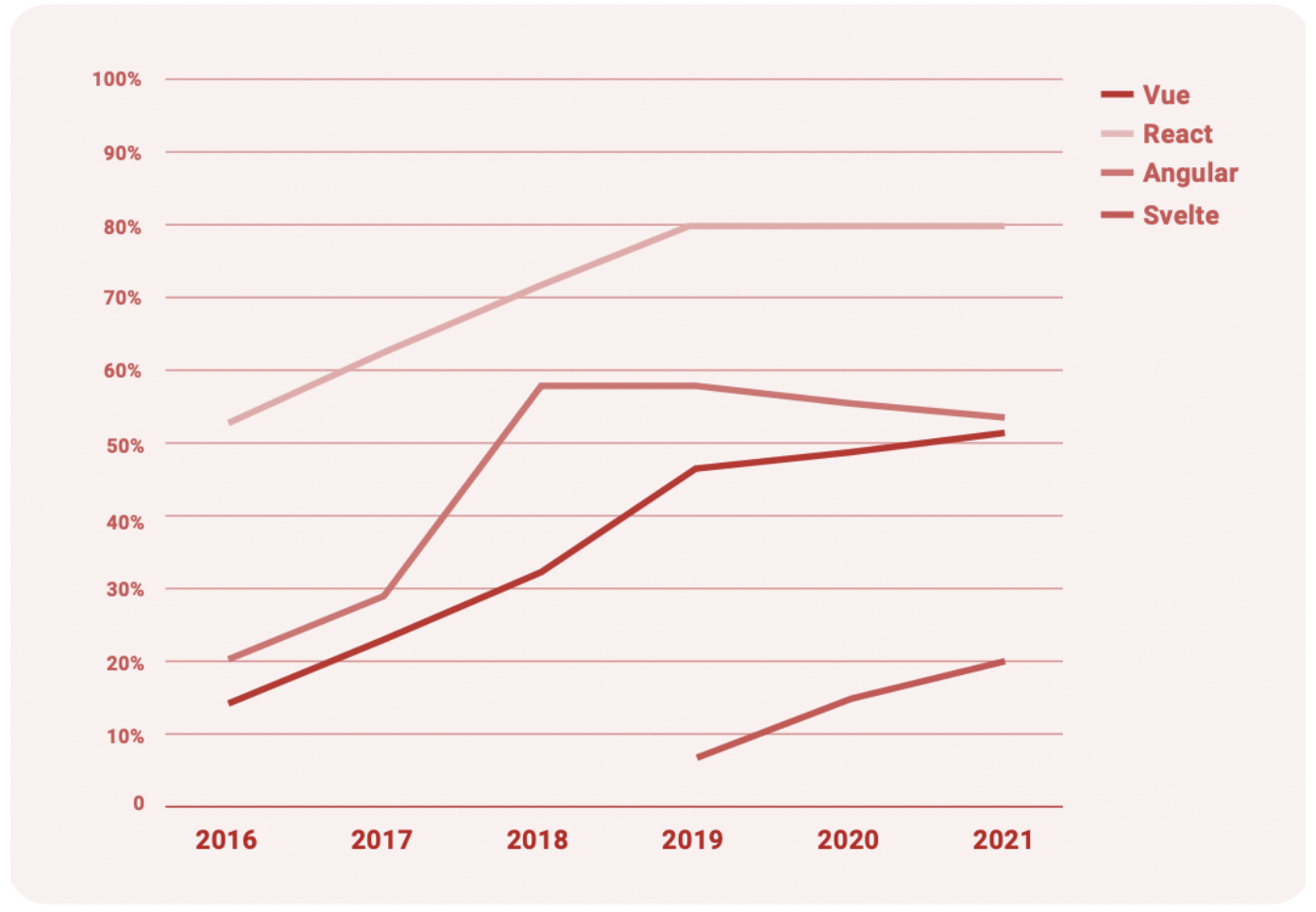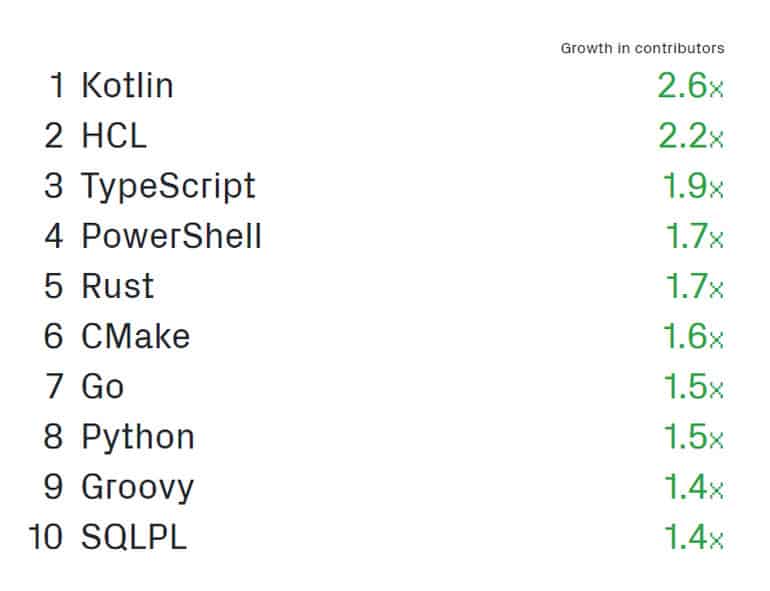How Much Has Vue.js Grown in 2019?
TL'DR
As the Vue.js community continues to evolve, 2024 marks a significant transition with the end of support for Vue 2, now succeeded by Vue 3 since December 2023.
In 2022, Vue.js saw an upward trend in developer retention, interest, usage, and awareness, reaching 77.4%, slightly down from 80% in 2021.
Vue is a JavaScript framework renowned for its versatility in building dynamic user interfaces. It leverages standard HTML, CSS, and JavaScript to offer a declarative, component-based programming model.
It caters to a wide spectrum of frontend development needs, from enhancing static HTML pages to powering Single-Page Applications (SPAs), Fullstack applications with Server-Side Rendering (SSR), Jamstack sites, and more.
Vue's flexibility and incremental adaptability make it suitable for projects of varying complexity and across diverse platforms, including desktop, mobile, WebGL, and even terminal applications.

Attributes of Vue js Framework
Vue.js enables developers to augment HTML with special HTML attributes known as directives. These directives empower HTML applications with essential functionality, whether they are predefined within Vue.js or custom-built by developers. The Vue.js framework offers a comprehensive suite of features that simplify UI development and enhance user interaction:
- Transitions and Animations: Vue.js provides multiple methods for adding transitions to HTML elements when updating or altering the DOM. It supports integration with third-party animation libraries, enabling developers to create more engaging user interfaces.
- Virtual DOM: Vue.js operates using a Virtual DOM mechanism. This approach ensures that changes to the application state are first reflected in a virtual representation of the DOM, implemented as JavaScript data structures.
- Computed Properties: Computed properties are a fundamental feature of Vue.js that allows developers to observe changes and perform necessary computations that automatically update in response to changes in their dependencies, enabling more dynamic and efficient management of data within components. These properties offer a clean and efficient way to handle various tasks including filtering data, performing calculations, setting data etc.
- Templates: Vue.js utilizes HTML-based templates to bind Vue data to the DOM. These templates are compiled into Virtual DOM render functions, simplifying UI development and optimizing performance by efficiently updating the DOM.
- Data Binding: Vue.js facilitates easy manipulation of HTML element attributes and properties through data binding directives such as v-bind. This feature streamlines the process of updating UI elements based on application state changes. Two-way data binding with v-model simplifies form input bindings, ensuring that changes in the UI reflect in the underlying data and vice versa.
- Libraries and Tooling: Vue.js includes a robust ecosystem of libraries and tools essential for modern web development:some text
- DevTools: Browser-based development tools for debugging Vue.js applications.
- Vue CLI (Command Line Interface): Official CLI for scaffolding and managing Vue.js projects, including core libraries and third-party plugins.
- Vue Router: Official router for building single-page applications (SPAs) with Vue.js, enabling mapping and navigation between components.
- Vue Loader: Webpack loader for processing Vue.js single file components, facilitating seamless integration into webpack-based workflows.
Vue.js stands out in the JavaScript framework landscape by offering a cohesive and flexible approach to building interactive and scalable user interfaces. Its rich feature set and developer-friendly tooling make it a preferred choice for both beginners and seasoned developers aiming to deliver modern web applications efficiently.
Top Practical Benefits Of VueJS
Vue.js, a progressive JavaScript framework, offers a multitude of practical benefits that contribute to its popularity among developers. Here are some of the top practical benefits of Vue.js:
- Ease of Integration: Vue.js is designed to be incrementally adoptable, meaning it can be integrated into existing projects easily. Developers can add Vue.js to a single page or component without rewriting the entire application, making it versatile for both new and legacy projects.
- Simplicity and Flexibility: Vue.js prioritizes simplicity and ease of use. Its straightforward API and clear documentation enable developers to quickly grasp its concepts and start building applications. This simplicity also allows for flexible development approaches, accommodating various project requirements and coding styles.
- Component-Based Architecture: Vue.js embraces a component-based architecture, where UIs are composed of self-contained, reusable components. This modular approach promotes code reusability, maintainability, and scalability. Components can encapsulate their own logic, templates, and styles, facilitating easier collaboration among teams.
- Reactivity and Two-Way Data Binding: Vue.js utilizes a reactive data binding mechanism, enabling automatic synchronization between the model (JavaScript data) and the view (DOM). Two-way data binding with v-model simplifies form input binding, ensuring that changes in the UI update the data model and vice versa, reducing boilerplate code and enhancing developer productivity.
- Virtual DOM and Performance Optimization: Similar to other modern frameworks, Vue.js employs a Virtual DOM to efficiently update and render the DOM. By minimizing DOM manipulations and batching updates, Vue.js enhances application performance. Its reactivity system ensures that only components affected by data changes are re-rendered, optimizing rendering speed.
- Versatile Templating: Vue.js offers HTML-based templates that are straightforward and intuitive. Templates bind the DOM with Vue's data model and directives, enabling developers to create dynamic and interactive interfaces effortlessly. Templating simplifies UI development by separating concerns and promoting a clear division between presentation and logic.
- DevTools and Debugging Support: Vue.js provides official browser extensions and DevTools for debugging Vue applications. These tools offer real-time inspection of component hierarchies, data flow, and performance profiles. They facilitate efficient debugging, profiling, and optimization of Vue applications during development and testing phases.
- Ecosystem and Community Support: Vue.js benefits from a vibrant ecosystem and a supportive community of developers. It offers a wide range of plugins, libraries, and third-party integrations (e.g., Vue Router for routing, Vuex for state management) that extend its core functionality. Community-driven resources, forums, and tutorials contribute to continuous learning and adoption.
- Progressive Framework: Vue.js is known as a progressive framework, allowing developers to adopt features incrementally based on project requirements. Whether building a simple interactive component or a full-fledged single-page application (SPA), Vue.js scales seamlessly. Its adaptability makes it suitable for prototyping, rapid development, and production-grade applications alike.
- Accessibility and Documentation: Vue.js prioritizes accessibility and provides comprehensive documentation that guides developers through installation, setup, and usage. The documentation includes examples, API references, and best practices, empowering developers to leverage Vue.js effectively and address common challenges during application development.
These practical benefits make Vue.js a compelling choice for web developers seeking a modern, efficient, and user-friendly framework for building dynamic and performant web applications.
Factors Contributing to Vue.js' Popularity
Vue.js has garnered significant popularity in the web development community due to several key factors that contribute to its appeal and adoption. Here are the primary factors contributing to Vue.js' popularity:
Ease of Learning and Use:
Vue.js is renowned for its gentle learning curve, making it accessible to developers of varying skill levels. Its syntax and API are intuitive and straightforward, allowing developers to quickly grasp concepts and start building applications without extensive training. The simplicity of Vue.js encourages rapid prototyping and iteration, promoting developer productivity.
Versatility and Incremental Adoption:
Vue.js is designed to be incrementally adoptable, meaning it can be integrated into existing projects or used to build new applications from scratch. Developers can introduce Vue.js into specific parts of an application or gradually migrate entire projects, thanks to its flexible architecture. This versatility appeals to teams working on both small-scale prototypes and large-scale, enterprise-level applications.
Thriving Ecosystem and Community Support:
Vue.js benefits from a vibrant ecosystem of plugins, libraries, and third-party integrations that extend its core functionality. Popular libraries such as Vue Router for routing and Vuex for state management complement Vue.js, offering solutions for common development challenges. The Vue.js community is active and supportive, contributing to a wealth of resources, tutorials, and forums where developers can seek guidance, share knowledge, and collaborate on projects.
Adoption by Large Companies and Organizations:
Vue.js has gained traction among large companies and organizations, including Alibaba, Xiaomi, Adobe, GitLab, and Grammarly, among others. This adoption underscores Vue.js' reliability, scalability, and suitability for building enterprise-grade applications. The endorsement and usage by prominent tech companies further validate Vue.js as a robust framework for diverse use cases.
Continuous Improvement and Long-Term Support:
Vue.js is backed by an active core team and a dedicated community committed to continuous improvement and long-term support. Regular updates, enhancements, and new features ensure that Vue.js remains relevant and aligned with evolving web development trends. The framework's commitment to stability and backward compatibility provides developers with confidence in its reliability and future-proofing capabilities.
The Appeal Of The Vue FrameworkFirstly, the thing that developers are attracted to the most is that the Vue framework has fairly straightforward documentation that is easy to follow and quite simple to learn. Developers love the fact that they can create high-performance as well as lightweight applications using Vue, in addition to the robustness that it also provides.How Will 2019 Pan Out For Vue? 2019 is expected to be a big year for Vue.js development. Apparently, the Vue codebase is presently being written using TypeScript. If you're thinking this is just another hoax, it's not! The entire framework is being rewritten from top to bottom. Much like the Vue framework itself, TypeScript has also been growing in leaps and bounds over the last few years. TypeScript accounted for more projects on GitHub than Shell, Ruby, C, and others in 2017 and 2018. A recent survey conducted by StackOverflow shows that TypeScript is ranked 12th in the list of the most popular programming languages among the developer community. Many developers consider TypeScript to be easier to learn and debug than JavaScript because they feel like they possess total control over each variable, array, etc used in their code as well as the static type checking nature (which is quite similar to Java).

Developers have also found that using TypeScript also results in fewer bugs and improved readability (especially important in the case of large teams where your code has to be easy-to-understand and clear to other coders) owing to the fact that the language does not make use of type coercion. If you are a Vue developer that you needn't concern yourself too much with TypeScript (as TypeScript is supposedly a variant of ECMAScript) and can continue to use JavaScript for your projects. However, if you wish to make contributions or changes to the Vue code, then learning and using TypeScript is a must.

Using TypeScript, Is It Advantageous?If you're feeling apprehensive about the Vue.js framework's migration, don't be! Not only is Vue 3 expected to be much faster than Vue 2 but the source code will also become more maintainable as the size of the entire Vue package will be reduced from 20kb to under 10 kb, which is phenomenal. The TypeScript for Vue is also going to be improved significantly for Vue 3.Other Improvements To Expect
- Virtual DOM
One of the major changes that will witnessable in the upcoming Vue 3 is the dramatic improvement in the performance of the Virtual DOM. The Vue's application boot-up speed is expected to nearly double as a result of this change. Apart from the drastically reduced boot-up time, the static tree hoisting, static prop hoisting along with a few other aspects, are also expected have reduced compile times.
- Observers
It is believed that the latest version of the Vue framework will bring with it completely improved property observations, owing to the fact that Vue 3 will feature a proxy-based observer which takes care of some of the limitations in earlier versions of the framework. With Vue 3, developers will soon be able to seamlessly track all changes, such as the appending or deletion of a property, mutation of array indexes, lengths, etc.
- Debugging
Debugging is also expected to get a whole lot easier in the soon-to-be-released Vue 3. Developers will be able to seamlessly identify any component that is re-rendering with the help of hooks such as renderTracked, renderTriggered, and more.Apart from the above-mentioned improvements to the Vue framework, Vue 3 will also feature optimized slots generation, which allows for parent and child nodes to be re-rendered separately. IE11 support and Platform Agnosticism (native projects such as Weex and NativeScript Vue that are much easier to render) are some of the other improvements that one can look forward to. The simplicity of the Vue framework along with all these mentioned improvements is sure to fuel its growing popularity in the developer community, making it a strong and worthy adversary to giants such as Angular and React JS.What The Future Holds For The Vue FrameworkAlthough the release of Vue 3 might be pushed into 2020 instead of this year, one thing is for certain - the effects of the changes to the framework will not be felt until 2020. As these new features and the improved performance begins to make waves in the developer community, it is only a matter of time before the Vue framework becomes widely adopted by organizations worldwide. It is also safe to presume that conventional maintenance activities will continue even after the release of Vue 3. Developers can also expect Vue 3 to be constantly updated with new and improved features over time, just as with Vue 2 (which saw features being added even two years after it was released).ConclusionNot only is the Vue framework fun to learn and extremely easy to use, the sheer amount of resources available its creators and the support community that surrounds it, make Vue.js a must-try for your next project! A number of CTO from top-tier and mid-range companies have attested to the fact that once their developers started using Vue, they didn't want to go back to their old frameworks. Vue.js is phenomenal in that it causes even the most hard-core programmers (who are the most staunch users of other frameworks) to develop an affinity and comfort with it, that is not witnessable with any other framework. So if you are looking to make changes to the way your developer team functions at present, then you might seriously want to consider mixing things up by introducing Vue to them.If you are a developer who has heard about the many advantages of the Vue framework over other popular JavaScript frameworks and is keen on using it, then this is the best time to do so! Despite all the new features and drastic changes that are expected to be made to Vue 3, the framework is showing no signs of slowing down. In fact, it is only a matter of time before it passes React in terms of popularity.
Conclusion
Vue.js provides a variety of ways to implement transition effects and is supported by extensive documentation. Its robust environment features powerful tools like Vue Router for single-page applications and Vuex for state management.
Thanks to its straightforward design, Vue has an easy learning curve, allowing users to quickly identify and fix coding errors. With the Vue ecosystem and Vue CLI, whether developers are creating a small proof-of-concept app or a fully developed web app, Vue ensures excellent performance.
By integrating the best elements of AngularJS and ReactJS, Vue has emerged as a strong competitor, earning its place as one of the most efficient and popular frameworks.







.png)
.png)
.png)
.avif)














